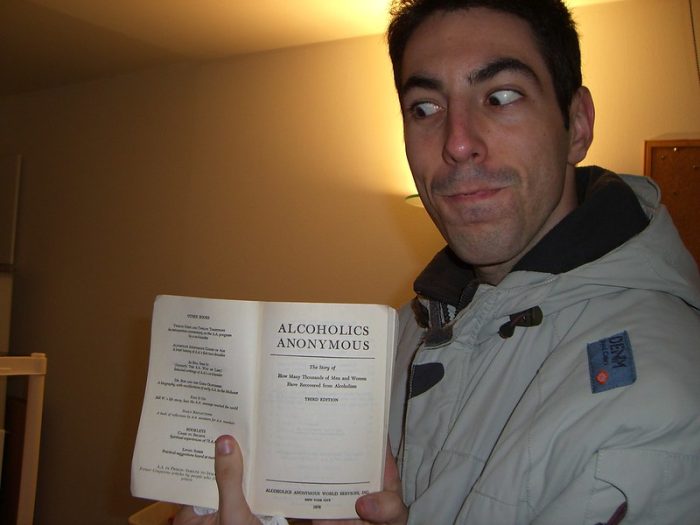A couple months ago, I decided to recover out loud…on Facebook.
So, my recovery is now official.
Bad joke aside, I told how far gray-area drinking took me before I got off the sh*tty hamster wheel. Within hours, friends, acquaintances, and family shared their own sober stories in the comments. Others were brave enough to share how they’re questioning their own relationship with alcohol. I was floored by their vulnerability and felt hope that our collective voices may help shed the shame many feel when they realize they need to ditch alcohol for good.
That said, I honor and respect anyone’s reason to keep their story private. Anonymity can be one of the most essential ingredients to making sober living stick. Privately, a few people asked about 12-step programs, specifically AA. I will share that I’ve gone to several AA meetings, and while it didn’t end up being my route to recovery, these groups can be powerful and life-saving.
Sadly, Hollywood portrays AA and other recovery scenarios as a group of sad people huddled in a dark church basement drinking stale coffee and eating day-old donuts. I’m here to tell you…that’s somewhat true. I’ve been to three different churches and the coffee sucks. But the people are far from sad. They are real, vulnerable, thoughtful, empowered, and genuine. My opinion is that AA provides the core values that make any recovery program successful: Connection, Validation, Accountability, and Service.
Just bring your own coffee.
Many others asked about alternative groups and resources I attend or use, so I thought I’d park them here for reference. The recovery community has exploded in the last few years. Exploded! And the medical research around how alcohol negatively impacts your physical and mental health is more and more conclusive. There are so many ways to connect and learn now (and once you know something, you can’t unknow it).
Big Alcohol is here to stay. There’s no questioning that. But perhaps, in the not-so-distant future, Big Alcohol’s advertising will be relegated to the kids’ table. Right next to Big Tobacco. The voices in recovery are getting loud; it’s a revolution anyone could be part of.
Sober Instagram Community
…and so many others (all one has to do is search “Recovery” and profiles will pop up)
Facebook private groups
…and many others (a quick search is all one needs to do)
“Quit Lit” Books
This Naked Mind (explains the science of the brain behind addiction. This really helps one understand why they drink (again!!) at 5 p.m. when they promised themselves at 3 a.m. they wouldn’t).
We Are the Luckiest
The Sober Diaries
Quit Like a Woman
Alcohol Explained
The Unexpected Joy of Being Sober
Sober Curious
…and soooo many more. Search “quit it” in the Google Machine
Podcasts
For me, these acted like a meeting when the world shut down. Grab your phone, go to a beautiful spot in nature, and listen to these stories while you walk for an hour, two hours, all day. The walk+podcast was a saving grace.
….and (you guessed it) so many more….
Meditation
The Insight Timer app is great for this one. It allows for short five-minute attempts for anyone who is convinced they have no time for mediation (this is me raising my hand).
Calm and Headspace are other good apps.
Journaling
Even just three minutes a day. Writing five things you’re grateful for can help set the day. The science behind how journaling helps is amazing. It connects your left and right brain. So one side has all these thoughts cascading through your mind. Writing them down starts to organize them and help you free-associate to the point where you feel better simply writing.
Nature
Get outside. Go for a walk or run. Bundle up in cold weather. Be in nature. It’s not about “sweating” or” burning calories.” It’s about what the outside air can truly do for your well-being. (I rolled my eyes incessantly at this suggestion…until it worked.)
Support groups
AA has an app called “Meeting Guide.” The icon is a folding chair. It will give you a list of meetings near any location you designate.
My group is Women for Sobriety (WFS) and its New Life Program. Many struggle with the language in AA, and I get that. WFS has 13 statements, and when broken down, they are similar to AA’s 12 steps. But many women in the New Life program believe these statements bring more positivity and empowerment to their recovery.
AA has done so much for so many, but it is not the only way. Connecting to new people, new resources, and new ways of thinking can serve as a solid foundation to a recovery program custom-tailored to one’s own path to recovery. We’re all hoping to get to a similar destination, and everyone gets to take the route they carve out for themselves.
So many of those who ask questions are taking such a huge step. Simply evaluating alcohol’s place in your life is more than many do. I love and see you and wish you peace of mind.
~












Read 3 comments and reply